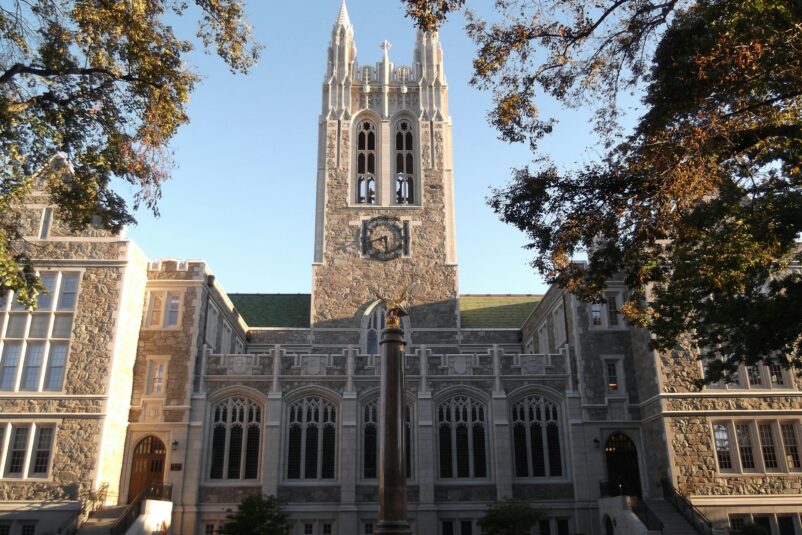Boston College is a private research institution with a Jesuit history. Founded in 1863, Boston College began as an undergraduate liberal arts college, hence the name, but today maintains a graduate program as well. Their accomplished alumni include John Kerry, Lulu Wang, Lesley Visser, and Amy Poehler. Hoping to join their ranks? First, you’ll need to write your Boston College supplemental essay. Let’s dive in.

Boston College’s 2025-2026 Prompts
Boston College has set five prompts for its undergraduate applicants. But don’t worry, you only need to write a response to one of them. If you are applying to the Human-Centered Engineering major, you must select the fifth prompt. All other applicants can choose between the other Boston College supplemental essay prompts. In addition, each essay has a maximum length of 400 words.
Without further ado, here are the prompts:
- Strong communities are sustained by traditions. Boston College’s annual calendar is marked with both long-standing and newer traditions that help shape our community. Tell us about a meaningful tradition in your family or community. Why is it important to you, and how does it bring people together or strengthen the bonds of those who participate?
- The late BC theology professor, Father Michael Himes, argued that a university is not a place to which you go, but instead, a “rigorous and sustained conversation about the great questions of human existence, among the widest possible circle of the best possible conversation partners.” Who has been your most meaningful conversation partner, and what profound questions have you considered together?
- In her July 2009 Ted Talk, “The Danger of a Single Story,” Chimamanda Ngozi Adichie warned viewers against assigning people a “single story” through assumptions about their nationality, appearance, or background. Discuss a time when someone defined you by a single story. What challenges did this present and how did you overcome them?
- Boston College’s Jesuit mission highlights “the three Be’s”: be attentive, be reflective, be loving – core to Jesuit education (see A Pocket Guide to Jesuit Education). If you could add a fourth “Be,” what would it be and why? How would this new value support your personal development and enrich the BC community?
- Human-Centered Engineering (HCE) Applicants only: One goal of a Jesuit education is to prepare students to serve the Common Good. Human-Centered Engineering at Boston College integrates technical knowledge, creativity, and a humanistic perspective to address societal challenges and opportunities. What societal problems are important to you and how will you use your HCE education to solve them?

General Tips
Unless you are applying to the Human-Centered Engineering program at Boston College, you will need to choose between these prompts in order to write your essay. Let’s dive into why you might want to choose one of the prompts over the others.
Prompt 1 should be chosen by students who have deep connections to their cultural heritage, family customs, or community practices. If you’re someone who values continuity, shared experiences, and the ways rituals bring people together across generations, this might be the right prompt for you. This is also ideal for students who want to showcase their understanding of community building and social bonds.
Prompt 2 is the right choice for students who seek to understand others’ points-of-view and foster meaningful discussion on profound topics. Students interested in intellectual curiosity, deep relationships, mentorship, or philosophical exploration will be able to answer this prompt effectively. This works well for students who can demonstrate growth through dialogue and learning from others.
Prompt 3 should be chosen by the student whose identity or identities have significantly impacted their life, whether repeatedly or on one significant occasion. If you have had to show resilience in your life in the face of discrimination, false assumptions, and so on as a result of your identity or identities, then this might be the chance for you to share that experience with the reader.
Prompt 4 is the right prompt for individuals who have thoughtful ideas about personal growth, education, and community values. If you can articulate a meaningful addition to BC’s Jesuit principles and connect it to both your own development and the broader community, this prompt allows you to demonstrate your alignment with BC’s mission while showcasing your unique perspective on what makes education and community meaningful.
Now that you have a sense of which prompt(s) might be right for you, scroll ahead to read the breakdown of each of the Boston College supplemental essay prompts!
Boston College Supplemental Essay Questions
Strong communities are sustained by traditions. Boston College’s annual calendar is marked with both long-standing and newer traditions that help shape our community. Tell us about a meaningful tradition in your family or community. Why is it important to you, and how does it bring people together or strengthen the bonds of those who participate? (400 words)
This prompt asks you to analyze how traditions create community bonds while revealing your own values and connection to shared experiences. Choose a tradition that genuinely resonates with you—whether it’s a family custom passed down through generations, a cultural celebration, or even a newer community practice that has developed meaning over time. Remember to provide enough context so the reader understands what the tradition involves and who participates. Then explain why it’s personally significant to you using specific examples and memories rather than general statements about its importance.
The key here is about analyzing how this tradition brings people together and strengthens bonds. Consider the mechanisms at work: Does it create shared experiences and common memories? Connect people across generations? Reinforce shared values? Provide opportunities for mutual support? Think about both immediate effects during the tradition and lasting impacts on relationships.
Finally, reflect on what this tradition reveals about your values and how it has shaped you. What does your appreciation for this tradition say about what you value in community and relationships? How might these values translate to your experience at Boston College, which emphasizes community and tradition?
The late BC theology professor, Father Michael Himes, argued that a university is not a place to which you go, but instead, a “rigorous and sustained conversation about the great questions of human existence, among the widest possible circle of the best possible conversation partners.” Who has been your most meaningful conversation partner, and what profound questions have you considered together? (400 words)
This prompt explores your intellectual curiosity and ability to learn through dialogue. Choose someone with whom you’ve had genuinely substantive exchanges about big ideas (not just casual conversations). This could be a family member, teacher, mentor, or friend who has pushed your thinking or helped you explore complex questions. Provide additional background information about this person and what makes them a valuable conversation partner. What draws you to conversations with them? Their different perspectives, expertise, ability to ask probing questions, or willingness to challenge your thinking?
Focus on one or two significant conversations about truly profound questions—philosophical topics about meaning and ethics, questions about social justice or society, or inquiries into science, art, or human nature. Instead of just listing topics, describe how these conversations unfolded, what perspectives each of you brought, and how your thinking evolved through the exchange.
Reflect on what you’ve learned both about the topics and about learning through dialogue: How has this conversation partner changed your perspective? What have you discovered about the value of different viewpoints?
In her July 2009 Ted Talk, “The Danger of a Single Story,” Chimamanda Ngozi Adichie warned viewers against assigning people a “single story” through assumptions about their nationality, appearance, or background. Discuss a time when someone defined you by a single story. What challenges did this present and how did you overcome them? (400 words)
If this prompt speaks to you, select a specific occasion when someone defined you by a single story. Because the prompt says “a time” and “someone,” you should write focus on one occasion and one person. In other words, a pattern of experiences is not what this essay prompt is seeking.
As you write this essay, you can either employ a narrative structure or a more expository structure. This means you can either write about this occasion in your life as though it is a story (with dialogue and scenes), or you can write the whole essay as a reflection on this experience. If you choose to write the essay as a story, then you should leave room for reflection upon the experience at the end of the story.
Lastly, you’ll need to leave room in your essay for discussion of the challenges presented by this experience, how you faced and overcame these challenges, and what you learned from the experience (this last topic can be the focus of your reflection). College admissions officers seek resilient students who can face the challenges the world throws at them and come out of the experience with knowledge. Demonstrating how you overcame these challenges and learned from them will give the reader confidence that you will also succeed in a challenging university environment.
Boston College’s Jesuit mission highlights “the three Be’s”: be attentive, be reflective, be loving – core to Jesuit education (see A Pocket Guide to Jesuit Education). If you could add a fourth “Be,” what would it be and why? How would this new value support your personal development and enrich the BC community? (400 words)
This prompt requires understanding BC’s Jesuit educational philosophy and thoughtfully contributing to it. Try to understand the existing values before considering how your fourth “Be” should complement these values while adding something meaningful and distinct. Consider what might fill gaps in the current framework or address challenges facing college students today. Examples might include “be courageous,” “be curious,” “be authentic,” or “be resilient”—but choose something that genuinely resonates with your values and experiences.
Explain your choice thoroughly using specific examples from your life. Why is this value important? How does it complement the existing three without repeating them? What does it mean in practice? In terms of the application, there are two components: personal development and the BC community. First, what aspects of yourself do you hope to grow in college? How would this value help you navigate anticipated challenges and become the person you want to be? And then, consider what specific benefits this “Be” would bring to classroom discussions, student life, or campus culture.
Throughout the essay, demonstrate your understanding of Jesuit values and enthusiasm for contributing to BC’s mission. Show that you see college as a community you can help strengthen, positioning yourself as an engaged future member of BC!
Human-Centered Engineering (HCE) Applicants only: One goal of a Jesuit education is to prepare students to serve the Common Good. Human-Centered Engineering at Boston College integrates technical knowledge, creativity, and a humanistic perspective to address societal challenges and opportunities. What societal problems are important to you and how will you use your HCE education to solve them? (400 words)
If you are applying to the Human-Centered Engineering program at Boston College, you must answer this prompt. If you are not applying to HCE, then you must choose one of the other prompts.
This prompt asks you to provide a list of societal problems that are important to you. Then, you must explain what aspects of the HCE will enable you to solve them. Of course, if a societal problem as broad as “world hunger” is important to you, you may be able to solve this issue for a group of people, or help society get closer to solving this problem, but the admissions team at Boston College does not expect you to have an entire solution to this vast, complex problem all mapped out and envisioned. After all, if it were that easy, a Boston College alum would have solved world hunger by now!
Instead, the admissions team anticipates that you will either have some societal problems in mind whose scope is small enough for you to reasonably tackle them upon graduation from Boston College; or, you are inspired to help work on solving some larger problem(s), but with the understanding that you as an individual will not solely invent and enact the solution.
You should focus only part of this essay on the societal problem(s) you wish to solve. Then, focus the rest of the essay on the aspects of the Boston College HCE education that will help you get closer to your goals. This prompt may not look like it at first glance, but it is actually a “Why Boston College?” essay. To be specific, it’s a “Why HCE?” essay that should zero in on the education’s applications to solving societal problems.
If you need help polishing up your Boston College supplemental essay, check out our College Essay Review service. You can receive detailed feedback from Ivy League consultants in as little as 24 hours.





